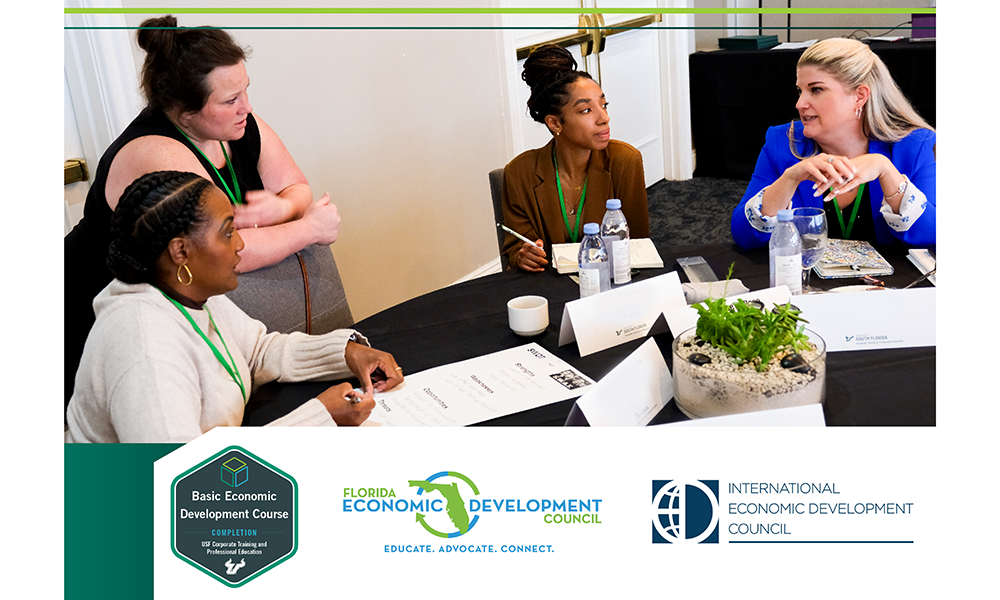In an era of rapid economic change, USF’s Basic Economic Development Course equips professionals with the skills and insights to drive sustainable growth in their communities. This November, 50 economic development professionals from across the United States, including representatives from as far as Delaware, Maine, and even California, traveled to Tampa for three days of immersive training. Participants spanned industries and professions, from city planning departments to regional economic councils, each united in a shared mission to revitalize their communities.
The talented group gained essential skills to advance their careers in economic development, connecting with industry leaders and qualifying to pursue the prestigious Certified Economic Developer certification. The CEcD is a professional credential for economic development practitioners, validating expertise across key areas such as business retention, real estate, and economic development finance.
According to the International Economic Development Council, which accredits and oversees the BEDC program, participants stand to increase their earning potential by nearly $25,000 per year with the CEcD certification, an invaluable benefit of attending USF’s BEDC. They also gain a competitive edge as the credential can help them transition into a higher-level role and/or a new area in the economic development field.
Offered through the Office of Corporate Training and Professional Education, USF’s BEDC takes place just once a year, making it the prime time for professionals to boost their skills and bolster their credentials.
EXPERT-LED LEARNING
This year’s BEDC was led by seasoned industry leaders, such as Jim McShane of CareerSource Capital Region, Tracy Garcia of Orlando Economic Partnership, and Suzanne Christman of Pinellas County Economic Development. They shared decades of hands-on experience with participants.
Sessions covered critical topics such as ethics in economic development, workforce development strategies, and entrepreneurial growth. The program also focused on current trends, from leveraging artificial intelligence in the workforce to strategic planning for future economic shifts.
Presentations included discussions on economic development marketing and attraction, ethics in economic development, real estate development and reuse, among others – each emphasizing the current conditions of these industry areas.
“It’s been incredible to see how much economic development touches,” said Betsy Sorg, an independent contractor in Central Florida. “From education to the workforce to the development of real estate, it’s everywhere. It ties a lot of things together, especially if you started in economic development without any formal training like I did.”
Designed to accommodate newcomers and seasoned professionals, the BEDC equips participants with the foundational knowledge to succeed in advanced economic development roles.
“The banter, stories, and anecdotes that people throw out are extremely valuable to the interactive nature of the course,” Sorg said.
By engaging in dynamic discussions and interactive group exercises throughout the course, they formed meaningful professional relationships with their peers in a more personal, direct way that is more challenging to achieve in virtual settings.
MAKING AN IMPACT
With nearly half a century of history, the course has shaped the future of economic development. Equipped with new skills and insights, this year’s graduates are now prepared to tackle pressing challenges in their communities – revitalizing local economies, attracting new businesses, and supporting small enterprises.
“The BEDC has enhanced the careers of countless economic development professionals throughout the country and even internationally,” said Kathy Barnes, associate director of the Office of Corporate Training and Professional Education. “The longevity of the course speaks to its continued relevance and reflects on USF’s role as a leader in fostering economic growth through education.”
The Florida Economic Development Council has been a steadfast partner in making this course accessible, offering support such as the Mickie Birdsall Scholarship, which allows professionals at all career stages to benefit from this crucial training.
USF’s commitment to economic development extends beyond the classroom. As a major contributor to the Tampa Bay region, USF generates an annual economic impact of $6.02 billion, supporting over 68,700 jobs, many of which are in high-skill, high-wage industries. The BEDC is just one of the university’s many initiatives that align with its mission to foster community prosperity while leveraging its resources for the public good.
